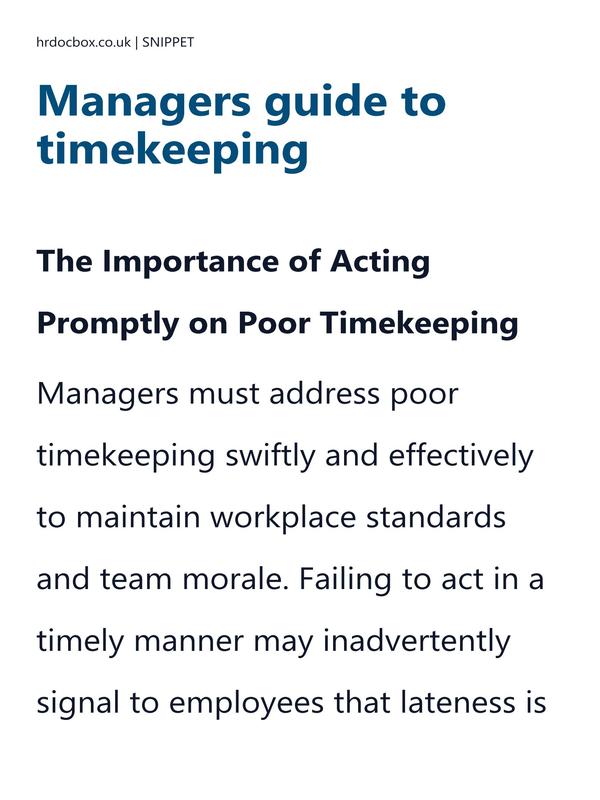Managers guide to timekeeping


Our Guide to Timekeeping for Managers helps leaders improve punctuality, manage attendance issues effectively, and maintain team productivity with confidence.
- Includes Managers guide to timekeeping, plus 12 months’ access with all updates provided free of charge and notified to you.
- UK-specific accuracy.
- 830 words over 3 pages.
- Last updated 27/09/2025.
- Format: Word / PDF / plain text / email.
- Delivery: Instant download after purchase (no physical item).
- Access: Download link shown here after checkout.
- This Managers guide to timekeeping will SAVE you up to 2 hours research. Save cost. Reduce risk.
Managers guide to timekeeping
The Importance of Acting Promptly on Poor Timekeeping
Managers must address poor timekeeping swiftly and effectively to maintain workplace standards and team morale. Failing to act in a timely manner may inadvertently signal to employees that lateness is acceptable, leading to habitual issues and complicating future interventions. Managers should also consider the wider impact of persistent lateness on team motivation, productivity, and the organisation’s reputation.
Identifying the Cause of Poor Timekeeping
Before taking action, managers should assess whether the cause of an employee’s lateness is:
-
Within the employee’s control:
-
Poor personal time management (e.g., oversleeping, failing to plan family or home responsibilities).
-
Using unreliable transport without contingency planning.
-
General lack of awareness or disregard for punctuality.
-
-
Attributable to workplace or personal circumstances:
-
Stress, overwork, or workplace bullying leading to sleep disturbances or anxiety.
-
Family emergencies, health issues, or caring responsibilities.
-
Managers must approach these discussions with sensitivity, giving employees an opportunity to explain any underlying issues while maintaining the expectation of improved timekeeping.
Suggested Thresholds for Action
1. Informal Action
An informal discussion is appropriate for isolated or infrequent instances of lateness. Suggested thresholds:
-
2 instances of lateness within a week or
-
3 instances within a month where the cause is within the employee's control.
Action:
-
Conduct a private, informal discussion to highlight concerns, clarify expectations, and agree on a plan
This is a 30% preview of the Managers guide to timekeeping. For instant full access, purchase this item or a parent bundle.
Managers guide to timekeeping purpose
This guide equips managers with essential knowledge and skills to effectively monitor and manage employee timekeeping, including establishing clear expectations, addressing lateness, managing unauthorised absences, and promoting accountability.
Managers should handle timekeeping issues when an employee, for example, consistently arrives late, takes extended breaks, takes too many breaks, leaves work before the scheduled time, or routinely fails to show up on time for meetings or team briefings.
Managers are typically able to settle a problem early on by having an open dialogue with the employee. If an informal approach does not result in a sufficient improvement, formal disciplinary action may be required. When dealing with timekeeping concerns, managers should strive to be fair, unbiased, consistent, and reasonable.
timekeeping workflow
timekeeping workflow
Check which resources should be implemeted before and/or after the Managers guide to timekeeping, to understand the workflow.
Concern about lateness letter
Our concern about lateness letter template helps managers formally address punctuality issues with employees, outlining expectations, and offering support to improve timekeeping.
Frequently Asked Questions about a Managers guide to timekeeping
Frequently Asked Questions about a Managers guide to timekeeping
-
Can I use the Managers guide to timekeeping in my small business?
Yes. The Managers guide to timekeeping is designed to be flexible and suitable for organisations of all sizes, including small businesses and charities. It follows UK employment law best practice, so even if you don't have an in-house HR team, you can confidently apply it.
-
Is the Managers guide to timekeeping compliant with 2026 UK employment law?
Absolutely. Like the Managers guide to timekeeping, all of our templates are drafted with the latest ACAS guidance and UK employment legislation in mind. We review and update them regularly, so you can be confident they remain compliant.
-
Can I customise the Managers guide to timekeeping for my organisation?
Yes, we highlight the areas of the Managers guide to timekeeping that you need to update with your own details, and where you need to make decisions to suit your situation. This saves you time and ensures that you meet best practice.
-
Do I get instant access to the Managers guide to timekeeping?
Yes. Once purchased, you'll be able to download the Managers guide to timekeeping instantly. Templates are provided in editable Word or Excel format so you can customise them easily, and in PDF format for easy sharing.
-
What if I need more help, not just a Managers guide to timekeeping?
If you're looking for broader support, we also offer toolkits and library bundles that include the Managers guide to timekeeping, along with other HR templates and policies for fully managing your situation. These may be more cost-effective if you need deeper advice.
-
Why should I use this Managers guide to timekeeping, and not AI to generate it?
The risk of using a free AI-generated template 'without review' includes your legal exposure, missing context, and no awareness of the wider process, whereas purchasing the Managers guide to timekeeping from us mitigates that risk.
